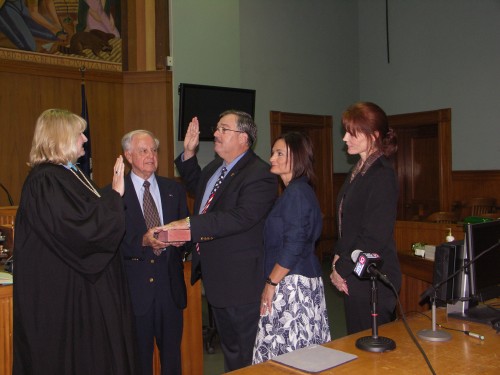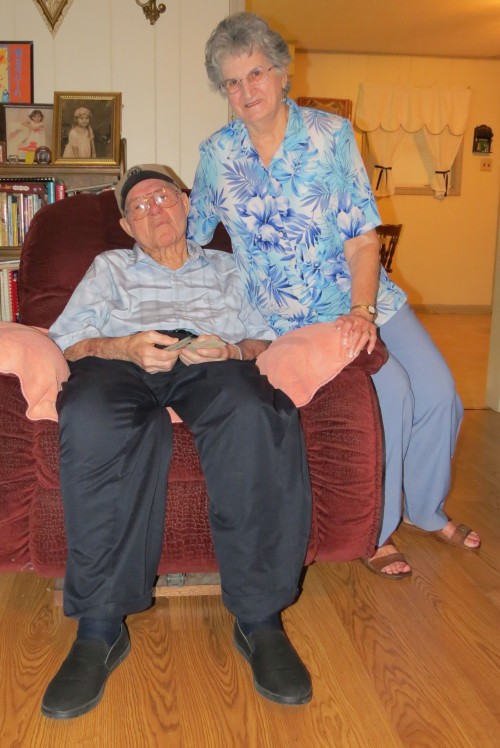
Larpenter takes office
July 3, 2012CRIME BLOTTER: Reported offenses in the Tri-parishes
July 3, 2012Taking care of a loved one with Alzheimer’s disease and other dementias is a full-time job for some Tri-Parish residents, and those looking for help are invited to attend Home Instead’s free Alzheimer’s presentation at the Lafourche Council on Aging at 9:30 a.m. July 9.
“So many of our clients have Alzheimer’s, and it is tough on family members,” said David Ditch, owner of the local Home Instead Senior Care branch, a business that specializes in non-medical in-home care services for seniors. “It is hard to for loved ones to deal with the disease 24/7. Most of our clients do not have 24/7 care for their loved ones.”
Alzheimer’s, one of the forms of dementia, is a form of brain function loss that gets worse over time.
Ruth Deroche of Bayou Blue is one council member who is taking care of a loved one who suffers from Alzheimer’s – her husband of 62 years, Lera.
“Some days are good,” Ruth Deroche, 82, said. “Lately he has been restless a lot. Just this morning, he wanted to go sit on the porch, and I told him it was too hot. He doesn’t understand that anymore.”
Lera Deroche, 84, was diagnosed with Alzheimer’s 20 years ago.
“The effects have been gradual,” Ruth said. “He no longer speaks. He points when he wants something. He couldn’t get his words out right, and he stopped speaking. It’s been about three years.”
The couple is among those who do not have full-time care, but with the help of a daughter who lives with them, other family members and an occasional sitter, Deroche said they are doing all right.
“I thank God for my health, and I stay active,” Deroche said. “It’s not hard on me. I depend on God and my faith.”
According to Deroche, the most difficult part of caring for her husband is at night when she tries to clean him and help him prepare for bed. He becomes easily agitated.
“Bathing him is troublesome,” Deroche said. “He slaps my hands. Things are good during the day. Every now and then he will walk around and dig in cabinets and closets.”
Over the years, Deroche and other family members have tried a range of activities to help her husband cope, from looking at photographs to driving down familiar bayou roads.
“He would remember a lot from the past, but not everything from the present,” Deroche said. “His short-term memory went many years ago. He was starting to forget things at work, and he eventually retired from being a diesel mechanic on rigs. We had a few good years after that. You could see he didn’t know where he was going sometimes.”
Deroche, once an avid solitaire player, went from playing with a proper deck to combining two decks and simply laying the cards down on the table, to not even touching the cards anymore. “He used to read a lot too, but now if you hand him a magazine, he just hands it back to you,” she said.
It is no doubt that the most heartbreaking part of coping with her husband’s Alzheimer’s is that realization that your spouse of more than half a century no longer knows who you are.
“Sometimes I think he knows who I am,” Deroche said. “Before he stopped talking, he would call me “Sis,” which is what most people who know me call me, but he stopped that before he stopped talking. He smiles at me sometimes, and I think he remembers who I am. I’ll be helping him put his belt on, and I’ll ask him if he wants to dance and he’ll smile. I joke and play with him a lot.”
Deroche plans on attending Ditch’s presentation at the Lafourche Council on Aging, which will be the second Ditch has given in the area, and one of many more that will be hosted in Iberia, St. Mary, Assumption, Terrebonne and Lafourche parishes.
“We gave our first presentation here in Terrebonne, and it spread by word of mouth,” Ditch said. “We had a very good turnout, 15-20 people, mostly family members. It was amazing how well it went, the response we got. Our presentation in Lafourche is going to be larger, and we are expecting a bigger turnout.”
Ditch hopes to give two presentations a month, and during the seminars, guests will learn more about the causes of Alzheimer’s disease and other dementias, how to recognize the symptoms of each, and learn how they are diagnosed. Attendants will also gain knowledge about the behaviors that can be caused by these diseases.
“The main question we get from family members of those suffering from Alzheimer’s or dementia are dealing with redirection, when affected seniors ask the same question over and over,” Ditch said. “We teach them how to break the monotony, the repetitiveness of the disease.”
One of the primary tools Ditch suggested using is a life journal, something he will be giving out at presentations. By creating a diary, starting with the loved one’s birth and highlighting life events, such as siblings, military service or a civilian career, marriage and children, family members may be able to show the volume to the dementia or Alzheimer’s afflicted elder, sparking a memory that will redirect them.
“Being able to show them photos, telling them about how they started a boat company when they got back from the war, got married and had children may help them,” Ditch said. “The journal can be used by family members and caregivers.”
The journal is part of Home Instead’s Alzheimer’s Care Training Program called “Capturing Life’s Journey,” and by using the journal, Home Instead taps into a client’s long-term memory since short-term memory is something those with Alzheimer’s or dementia have difficulty with.
Ditch, who has run the local Home Instead for ten years, will also be providing presentation attendants with a free guide, Helping Families Cope, on caring for a loved one with Alzheimer’s disease or other dementias. The guide has tips for families to keep their loved ones interacting and handling behaviors.
Like Ditch, the Lafourche Council on Aging also has many clients who are suffering from Alzheimer’s disease and other dementias.
“I am hoping for a good turnout,” said council executive director Charlene Rodriguez. “I am interested to see what tips David has for our clients. I would like to learn more about the life journal, which can be used to make things click with client’s routines. One Alzheimer’s patient that did not want to take a bath had been in the military, so his family told him that he would be having an inspection that afternoon. He showered, shaved and brushed his hair. Families don’t always know how to handle these situations.”
According to the Alzheimer’s Association, 60 to 70 percent of those afflicted with the disease live at home. In addition to memory loss, those taking care of a loved one with Alzheimer’s are sometimes faced with difficult behaviors such as anger, aggression, wandering and refusing to eat.
“We try to provide support for families of clients who have Alzheimer’s,” Rodriguez said. “Through our Respite Program, which is not just for families of Alzheimer’s patients, we have a volunteer sit at home with a client so that the family members can go get groceries or run errands.”
Those who wish to attend the event must reserve a seat by calling (985) 532-0457.
Ruth and Lera Deroche of Bayou Blue have been married for 62 years, and Lera was diagnosed with Alzheimer’s 20 years ago. Ruth has help from family members and a sitter as she cares for her ailing husband.












